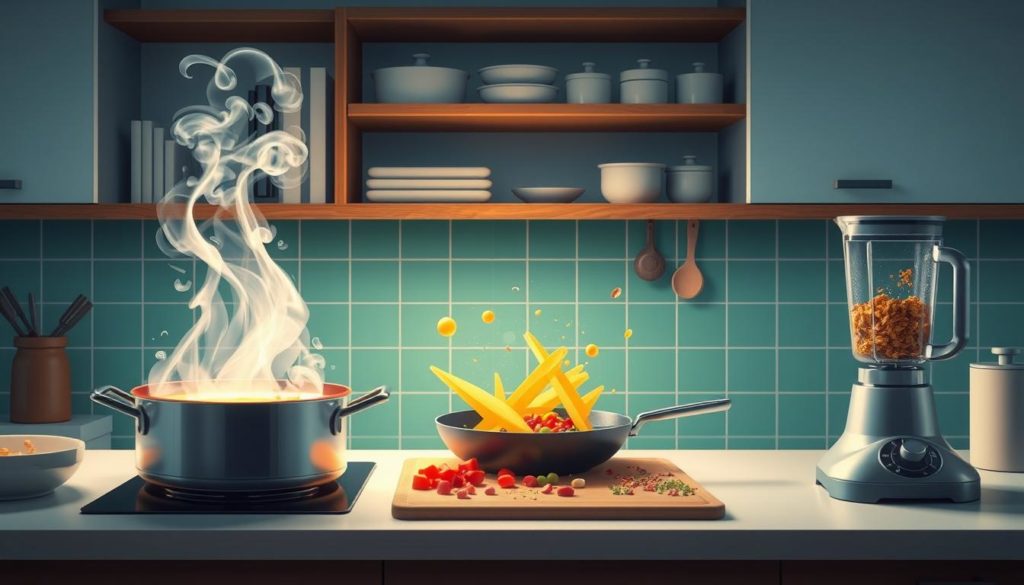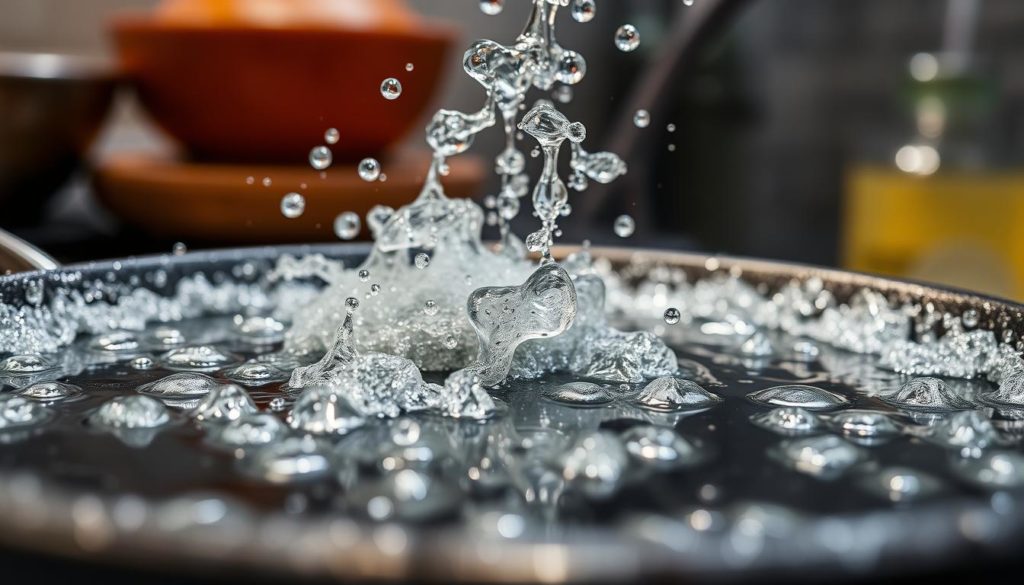Did you know that over 2,000 Americans suffer from eye injuries at home each day? Many of these happen in the kitchen. The kitchen is where we make our meals, but it can be risky for our eyes. When we cook, handle sharp objects, or deal with hot liquids, eye accidents are more likely.
It’s important to know about the dangers to our eyes and how to avoid them. By being careful and taking the right steps, we can keep our eyes safe.
Learning about kitchen safety and using eye protection can prevent most eye injuries. Wearing goggles or protective glasses while cooking, cleaning, and chopping helps a lot. Should an injury happen, it’s key to see an ophthalmologist right away. For issues like long-lasting pain or blurred vision, think about going to the emergency room.
Use these tips to avoid eye injuries in the kitchen. This will make cooking safer for you and your loved ones.
Understanding Common Kitchen Eye Hazards
The kitchen is full of dangers that can hurt our eyes. Kitchen Eye Injuries happen when we’re not careful about these risks. It’s very important to learn about the usual dangers and how to keep your eyes safe while cooking.

Firstly, hot grease and oil can be very dangerous. A splash can cause serious burns and may harm your vision for a long time. Sauce and liquids that bubble can also send hot drops flying into your eyes. Wearing goggles can protect your eyes from these dangers.
Touching your eyes after handling hot spices can cause pain. This is common if you do not wash your hands well. Also, cleaning products in the kitchen can hurt your eyes if they accidentally get into them. The American Academy of Ophthalmology says to wash your eyes with water right away if this happens.
- Hot Grease and Oil: Implement splatter screens and wear goggles.
- Bubbling Sauces and Liquids: Maintain a safe distance and cover pots.
- Spicy Residues: Wash hands thoroughly or use gloves.
- Cleaning Chemicals: Store safely and use protective eyewear.
To better protect your eyes in the kitchen, here’s a quick guide:
| Hazard | Preventive Measure | Emergency Action |
|---|---|---|
| Hot Grease & Oil | Wear goggles, use splatter screens | Flush eyes with water |
| Bubbling Sauces | Cover pots, maintain distance | Rinse eyes immediately |
| Spicy Residues | Wash hands, use gloves | Flush eyes thoroughly |
| Chemical Cleaners | Wear eyewear, store safely | Irrigate eyes with water, contact professional help |
Being aware and taking preventive steps are crucial to avoid Kitchen Eye Injuries. Stay cautious and act quickly if something goes wrong to keep your eyes safe in the kitchen.
Hot Grease and Oil Safety
Handling hot grease and oil in the kitchen can be risky. It’s important to know the dangers, like the chance of burning your eye with hot grease. To keep your kitchen safe, follow these key steps and advice:

Immediate Actions if Grease Splashes in Your Eye
Got hot grease in your eye? Don’t delay. Start by rinsing your eye with water right away. Make sure to wash it out for several minutes. And don’t rub the eye, as it might make things worse.
Preventing Grease Splatter with Protective Gear
Stopping kitchen accidents should be a priority. Wearing protective gear, like safety glasses or a grease shield, helps. This gear can lower the chance of getting hot grease in your eyes, helping prevent injuries.
Why Anti-Redness Drops are a Bad Idea for Grease Splashes
It’s tempting to use anti-redness drops for an irritated eye, but they’re not a good choice after a grease burn. These drops could make things harder to deal with. It’s better to get advice from a doctor to make sure you’re treated correctly and avoid making it worse.
Dealing with Bubbling Sauces and Splashing Liquids
When you’re cooking, keeping your eyes safe should be top of mind. This is really important when you’re working with sauces that bubble and liquids that splash. These can really hurt you and cause injuries.
First Aid for Sauce and Liquid Eye Exposure
If you get sauce or liquid in your eye, don’t wait. Rinse it out with water right away for 15 to 20 minutes. Doing this quickly is key to reducing harm and getting contaminants out of your eye.
Potential Dangers of Food Liquids in the Eye
Food liquids are more dangerous than you might think. For example, juices from raw chicken could have bacteria. This bacteria could cause infections if it gets in your eyes. Plus, some sauces are so acidic they can really irritate your eyes a lot. Knowing about these dangers shows why protecting your eyes in the kitchen is crucial.
| Type of Liquid | Potential Risk | First Aid Measures |
|---|---|---|
| Sauces | Acidic burns and irritation | Rinse with water for 15-20 minutes |
| Raw Chicken Liquor | Bacterial infections | Immediate thorough rinsing and medical consultation if discomfort persist |
| Oil Splatter | Heat burns and inflammation | Cool affected area, consult medical aid for persistent pain |
Avoiding Spicy Residues and Eye Irritations
Working with spicy ingredients can be tricky. Oils from spices like jalapeños may cause severe eye irritation. To keep your eyes safe, it’s key to use the right techniques and protective gear.
Proper Handwashing Techniques After Handling Spices
Washing your hands well after dealing with spices is crucial. To get rid of all spicy residues, follow these tips:
- Use warm water and soap.
- Scrub for at least 20 seconds, including under nails and between fingers.
- Rinse well and dry with a clean towel.
- If your eyes still feel irritated, try baby shampoo but avoid soap in your eyes.
Using Gloves to Prevent Spice Transfers
Wearing gloves is another effective way to protect your eyes. Gloves stop the spices from getting on your hands and then into your eyes. Pick gloves that fit well and won’t easily tear.
Here’s a short guide on choosing the right gloves:
| Glove Type | Material | Benefits |
|---|---|---|
| Latex | Natural rubber | Provides a snug fit, excellent dexterity |
| Nitrile | Synthetic rubber | Hypoallergenic, great puncture resistance |
| Vinyl | Plastic | Cost-effective, suitable for light-duty tasks |
To boost your kitchen eye safety, always wash your hands and use gloves. This way, you can enjoy cooking with spices and not worry about your eyes.
Risks of Cleaning Chemicals in the Kitchen
Cleaning your kitchen involves using risky products. These can seriously hurt your eyes if you’re not careful. It’s crucial to know the dangers and how to avoid them to keep your eyes safe.
Types of Hazardous Cleaning Products
- Bleach
- Oven Cleaners
- Drain Cleaners
- Ammonia-based Cleaners
- Degreasers
Some hazardous cleaning products can really harm your eyes. Understanding their risks helps you stay safe. This means you can clean without hurting your eyes.
Emergency Steps for Chemical Eye Exposure
- Immediately rinse the affected eye with lukewarm water for at least 15 minutes.
- Avoid rubbing or touching the eye, as this can worsen the injury.
- Seek medical attention promptly, especially if irritation persists.
If you ever get chemicals in your eyes, acting fast is key. Quick actions can help avoid serious harm.
Using Eye Protection While Cleaning
Wearing safety goggles can stop many eye injuries from happening. Make sure they fit right and are comfortable. This is essential when you’re using hazardous cleaning products.
Preventing Injuries from Sharp Objects
Kitchen tools like knives and scissors can easily hurt your eyes. It’s key to follow sharp objects eye safety tips to keep accidents away and make sure your eyes are safe. Here are some important ways to do this.
Safe Practices for Handling Knives and Sharp Tools
Always aim knife blades away from you and others to stay safe. Use a solid cutting board and curl your fingers while cutting. Sharp knives are safer because dull ones can slip and cause accidents.
Eye Safety When Teaching Children to Cook
Teaching kids to cook means being extra careful with sharp objects. Make sure they use tools that are right for their age and watch them closely. Show them the safe way to handle tools and stress not pointing sharp items at people.
For more tips on keeping your eyes safe in the kitchen, click here.
Importance of Safe Kitchen Layout
Making sure your kitchen is safely designed is more than just convenient. It’s key in keeping everyone safe from slips and falls. These can cause serious eye injuries, especially in older family members. A well-planned kitchen doesn’t just make cooking easier. It also cuts down on the chances of accidents. This keeps everyone safer, focusing on elderly eye safety in the kitchen and other potential dangers.
Identifying and Addressing Slip Hazards
A clean kitchen floor without clutter is step one to safety. Quickly cleaning up spills and fixing leaks reduces slipping. It’s also good to keep cabinets shut. Make sure to either remove loose rugs or use non-slip pads underneath to keep them in place. This really helps in reducing the risk of falling.
Additional Safety Tips for Elderly Family Members
Taking extra steps to keep elderly family members safe is crucial. Good lighting throughout the kitchen can make a big difference in preventing trips. It’s also wise to use non-slip mats or rugs that don’t move around. By putting things they use often in easy-to-reach spots, you avoid the need for step stools. This extra precaution boosts elderly eye safety in the kitchen.
- Use stools and chairs with armrests to provide additional support.
- Ensure the kitchen layout has clear and open pathways.
- Incorporate pull-out shelves to make accessing items easier.
| Safety Feature | Benefit |
|---|---|
| Non-slip mats | Reduces slipping and fall risks. |
| Bright lighting | Enhances visibility and reduces accident risks. |
| Pull-out shelves | Facilitates easier access to items, reducing the need for reaching. |
Being Cautious with Food and Home Remedies
Many people look for quick solutions to eye problems in their kitchens. But it’s key to know the truth about using food for eye care. Trying these methods out can be risky for your eye health.
The Myths About Using Food for Eye Treatments
There are lots of untrue stories about fixing eye issues with food. For instance, some think honey can change eye color or tea bags can fix pink eye. But there’s no science to support these ideas. Using food in your eyes can lead to infections or other serious problems.
Safe Alternatives to Dangerous Remedies
It’s smarter to use safe, proven treatments for eye issues. Always choose products made for eye care. For example, use artificial tears from the store or eye drops from a doctor.
When cooking, protect your eyes to avoid accidents. Wear safety glasses and keep your hands clean. Knowing basic eye first aid helps too. For more tips on keeping your eyes safe in the kitchen, check out WebMD.
Steam-Related Eye Injuries While Cooking
While cooking, steam eye burns are a real danger. This can lead to issues like blurry sight and swelling. It could even cause worse harm. So, it’s very important to wear eye protection in the kitchen.
Everyday cooking tasks can be risky. Boiling water or steaming veggies needs caution. By taking steps and using cooking eye protection, you can avoid accidents. Here are some tips to protect your eyes:
- Keep a safe distance from boiling pots and pans to avoid direct contact with steam.
- Utilize lids with vents or slotted spoons to release steam gradually.
- Wear safety glasses to shield your eyes, especially when working with high-pressure steam appliances.
Following these tips will make cooking safer and more enjoyable. Remember, cooking eye protection is key for kitchen safety.
Kitchen Eye Injuries: Recognizing When to Seek Medical Help
It’s key to know when you have a kitchen eye injury. Look out for signs like ongoing pain, red eyes, and changes in how well you can see. These signs mean you should get help right away.
If things like sharp pain or blurry sight happen, don’t wait to get help. These could point to serious problems. Do not just use store-bought eye drops. They might not help with your specific issue.
Seeing an eye doctor or going to the ER quickly is smart. By spotting kitchen eye injury symptoms early, you help protect your sight. Knowing when to get expert advice is crucial for your eye health.
General Kitchen Safety Tips to Protect Your Eyes
Keeping your kitchen safe is crucial. It helps avoid injuries and makes cooking fun. Eye safety is part of this. Start by keeping your area clean and tidy. This helps prevent accidents that could hurt your eyes. Properly storing sharp items like knives is also important. This keeps them from being a danger.
Wearing safety gear can lessen eye injury risks. Use protective eyewear when you deal with hot grease or spicy chemicals. Washing your hands well after touching spices, or wearing gloves, also helps. These actions keep irritants away from your eyes. Remember, stopping accidents before they happen is important. Small steps can lead to big safety improvements.
Don’t overlook the risk of slips and falls. They can hurt your eyes too. Keep your kitchen floor dry and clear of stuff that could trip you. Be extra careful if you have elders at home. They’re more likely to have accidents. Being careful and following these tips will make your kitchen safer. And if eye problems arise, see a doctor right away.
FAQ
What should I do if hot grease splashes into my eye?
Immediately flush your eye with water if hot grease gets in. Don’t use anti-redness drops. Seek help from an eye doctor.
How can I prevent grease splatter in the kitchen?
Wear glasses or use a grease shield to prevent splatters. This helps avoid corneal burns and injuries.
Are anti-redness drops safe for eye injuries caused by grease splatters?
No, don’t use anti-redness drops for grease-related eye injuries. Rinse your eye with water and see an eye doctor.
What immediate actions should I take if sauce or cooking liquid gets into my eye?
Rinse your eye right away with lots of water. This removes harmful stuff. If pain lasts, get medical help.
Why are food liquids dangerous for the eyes?
Sauces and raw chicken can have acids and germs. Rinse your eyes fast if they get splashed.
How should I wash my hands after handling spicy ingredients?
Wash well with soap and water after spicy foods. Baby shampoo helps remove spicy residue around eyes. Gloves also help.
What types of hazardous cleaning products should I avoid using without eye protection?
Always wear eye protection with bleach and oven cleaners. They can seriously harm eyes.
What are the emergency steps for chemical exposure to the eye?
Rinsing with water for a few minutes is crucial. Then, immediately see a doctor to avoid major damage.
How can I handle sharp tools like knives safely in the kitchen?
Be careful with knives and sharp tools. Store them safely. Show kids how to use them right to avoid cuts.
What additional safety tips should elderly family members follow in the kitchen?
Keep the kitchen safe for seniors. Clean, dry floors and good lights prevent falls. Secure rugs too.
Are there myths about using food for treating eye problems?
Yes, myths like using honey for eye color exist. Avoid these for eye problems. Use proper eye products instead.
How can I prevent eye injuries caused by steam when cooking?
Keep away from steam. Wear kitchen safety glasses. Open pots away from your face to avoid burns.
When should I seek medical help for an eye injury?
See a doctor if pain, redness, or vision problems continue after an injury. Fast help is key.
What general kitchen safety tips can help protect my eyes?
Wear eye protection. Be careful with sharp items and chemicals. Keep the workspace clean. Educate the family on safety. Always talk to doctors about eye worries.


